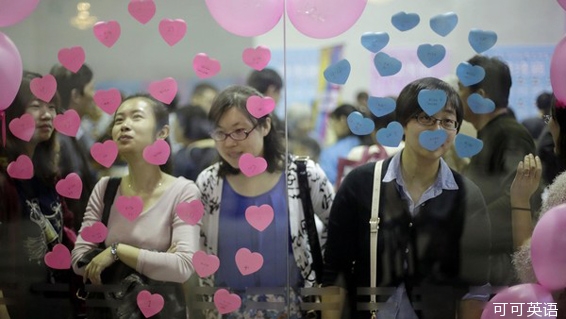
For singles in China under pressure to get married, there are plenty of professional match makers, and busybody parents. But for young people seeking to avoid such interference, there is now a bevy of smartphone apps offering a less formal approach.
对于中国面临结婚压力的单身人士来说,除了足够多的专业红娘以外,还有好管闲事的父母。但对于试图避免这类干扰的年轻人来说,有一大堆智能手机应用可以提供相对来说不那么正式的约会服务。
Momo, the most popular of China’s mobile dating services, uses a phone’s GPS to help users find the profiles and photos of people nearby that they can talk to online, or offline. It has added 30m registered users since July – giving it 80m.
中国最受欢迎的手机约会应用陌陌(Momo),使用手机的全球定位系统(GPS),帮助用户找到他们周围其他人的资料和照片,用户可以在线上与线下与之聊天。自今年7月以来,陌陌的用户人数已经增长了3000万人,总计达到8000万人。
“Everyone uses it just for fun, not taking it too seriously,” said one man who asked not to be named. “We are too young to get married, too young. Maybe some girls’ parents want them to get married so early, but my friends haven’t.”
一位不愿透露姓名的男士表示:“大家使用陌陌的目的都是为了好玩,没有太当真的。我们还很年轻,结婚为时过早。或许一些女孩的家长希望她们早早结婚,但我的朋友中还没有结婚的。”
Other new Chinese dating apps include Zhantai, which matches users who live by or commute through the same subway stations, and Dou Jiang You Tiao, a launch with backing from Irish venture capital group SOSventures.
中国新出现的其他约会应用包括:站台(Zhantai),它将沿同一条地铁线路通勤或居住的用户配对起来;以及豆浆油条(Dou Jiang You Tiao),该应用得到了爱尔兰风险投资集团SOSventures的支持。
Jiang Yucheng, a project manager on Blued – an app for gay men that has 2m users and $3m in funding from a Shanghai investor – believes apps have a great advantage over dating websites, which are generally designed for desktop PCs. “People can use a phone app in their down time, and we think a person’s down time is actually the majority of a person’s day.”
Blued是一款面向男同性恋者的应用,现已拥有200万用户,并从一位上海投资者那里得到了300万美元融资。Blued的项目经理蒋雨城(音译)认为,手机应用相对于约会网站来说有一个很大优势,后者通常都是针对个人电脑设计的。“人们可以在关闭电脑的时间里使用手机应用,而且我们认为一个人一天当中的大部分时间其实都不在电脑前。”
For other developers of dating apps, such as Tinder, making money in China can be more of a challenge than elsewhere.
对于Tinder等其他约会应用的开发商来说,在中国赚钱比在其他地方挑战更大。
One difficulty is that marriage preferences in China remain traditional and focused on family background or economic status, said Rui Ma, who runs the seed investor 500 Startups in Beijing. As few matches on Momo are likely to turn into something long-term people are less likely to pay a lot for the service.
掌管种子投资基金500 Startups北京业务的马睿表示,一大困难在于,中国人在婚姻问题上的取向仍然传统,并且看重家庭背景和经济条件。陌陌上配对的男女很少能转变为长期关系,因此人们不太可能愿意为这种服务支付高价。
She noted that, at offline dating events, “people bring their parents because your whole family’s buy-in is needed”.
她指出,在线下约会活动中,“约会者会拉上自己的父母,因为结婚需要整个家庭的投入”。


